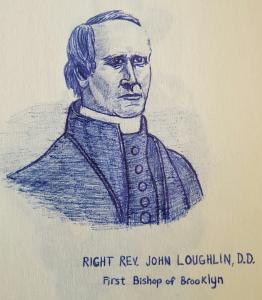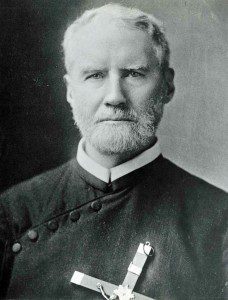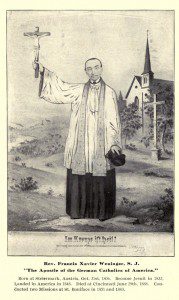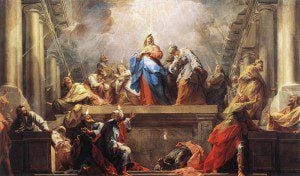![healing_10_lepers1[1]](https://wp-media.patheos.com/blogs/sites/224/2013/06/healing_10_lepers11-251x300.jpg) XLVII.—Gratitude. Luke, XVII., 11-19 (XIII. Sunday After Pentecost.)
XLVII.—Gratitude. Luke, XVII., 11-19 (XIII. Sunday After Pentecost.)
It is our strict duty to be thankful to God and men for favors received, and not only to feel our gratitude, but to express it in word and deed. The gospel that I have just now read to you, reminds us of this duty, for in it Our Saviour complains bitterly of men’s ingratitude. Out of ten whom He cured that day only one went back to thank Him. And Jesus said: “Were not ten made clean? And where are the nine? There is not found to return and give glory to God, but this stranger.”
It was a very great miracle that those nine were thankless for. Leprosy is an incurable disease, at least the doctors can do nothing with it. Once it lays hold of its victim, beginning on the outside, and from the skin gradually rotting its way inwards through flesh and bone, the physicians can only order the sick man removed to a leper-hospital, where other will not catch the disease from him and where he may be made as comfortable as possible until death relieves him.
Hospitals are an invention of Christianity and are all directly or indirectly a result of Our Divine Saviour’s teachings. There were no hospitals in His time; and hence the poor lepers had to shift for themselves. They were forbidden to enter any town or village and were forced to live as best they could out in the waste and desert places. Sometimes they dwelt alone in these solitary regions, and sometimes they lived together in groups. They were forbidden to come near to any healthy person, and if one should approach them, it was their duty to shout and warn him. Because this disease was as contagious and incurable as it is now.
Yet Our Divine Lord could cure it, as He could do all things. He did cure it over and over again. And so on that day, when the ten lepers all grouped together stood afar off, not daring to come nearer, and shouted to Him: “Jesus, Master, have mercy on us!” He simply spoke to them, and they were healed.
Certainly they should have been extremely thankful, for the favor granted them was a very great one. One of them was thankful, and expressed his gratitude. “One of them when he saw that he was made clean,” the gospel tells us, “went back, and with a loud voice glorifying God,” and fell upon his face before Our Saviour’s blessed feet, “giving thanks, and this was a Samaritan.” And Jesus said: “Were not ten made clean? And where are the nine? There is no one found to return and give glory to God, but this stranger.”
Let us ask ourselves today: Can it be so bad as this with us? Is it possible that among us only one out of ten properly give thanks to God for His blessings and favors?
To be thankful to God, is a solemn duty for us. “Be ye filled with the Holy Ghost,” wrote St. Paul, “giving thanks always for all things in the Name of Our Lord Jesus Christ and to God the Father” (EPHES. V, 18-20). “In all things give thanks,” he wrote again, “for this is the will of God” (I THES. V, 18). And a thousand years before St. Paul had written his inspired epistles, the royal prophet said: “Know ye that the Lord, He is God: He made us and not we ourselves. We are the people and the sheep of His pasture. Go ye into His gates with praise, into His court with hymns: and be thankful to Him” (PS. XCIX, 3, 4).
God strictly requires this of us, that we should “be thankful to Him.” A considerable part of our prayer should be thanksgiving, especially at Mass and at Benediction of the Blessed Sacrament. And even during the ordinary work-days of our lives “My God, I thank Thee!” or “Thanks be to God!” should be a common phrase on our lips and a frequent thought in our hearts.
It is our duty to give thanks not only to God, but to men. We must show our thankfulness even to the stranger who does any little courtesy to us. Good manners and good breeding are founded almost as largely on gratitude, as on humility; for gratitude is a law of nature, which no one can break without being unnatural. An ungrateful friend is inhuman. An ungrateful child is a monster and a freak. “he that rendereth evil for good,” says Holy Scripture, “evil shall not depart from his house” (PROV. XVII, 13). And those who are thankless towards men, will likewise be ingrates towards God. “He that loveth not his brother, whom he seeth, how can he love God, Whom he seeth not?” (I John, IV, 20).
So let us learn this lesson of today’s gospel, or re-learn it if we have perhaps known and forgotten it, to be grateful to men but above all to be grateful to God. We know that He is kind even “to the unthankful and to the evil” (LUKE VI, 35). But He is still kinder to those who do not forget to give Him thanks. We lose many new blessings by beginning to be thankful for the old ones. How much more powerful our prayers would be and how many more favors would they draw down from heaven, if we had only been careful to fitly thank God for His favors already received!
During that solemn part of the Mass when the priest is reciting or singing the Preface, these are the words of thanksgiving which the Church is sending up to God by his mouth: “Truly meet it is, right and wholesome, for us always and everywhere to give thanks to Thee, Holy Lord, Almighty Father, Eternal God, through Christ Our Lord! Through Whom the angels praise Thy majesty, the dominions adore it, the powers tremble, the heavens and the virtues of the heavens, with the blessed seraphim, exultantly with one heart glorify It. With whom, we beseech Thee, bid our voices be admitted, while we say in suppliant confession: Holy, Holy, Holy Lord God of Sabaoth! Heaven and earth are full of Thy glory. Hosanna in the highest! Blessed is He that cometh in the Name of the Lord! Hosanna in the highest!”
“What shall I render to the Lord for all the things that He hath rendered unto me,” exclaimed King David (Ps. CXV, 3). We can at least render “thanks, the sweetest, kindest, readiest recompense.” We can say with Holy Tobias: “I bless Thee, O Lord God of Israel, because Thou hast chastised me and Thou hast saved me!” (TOBIAS, XI, 17). When we notice the many good things of our chequered lives, we can frequently ejaculate with our lips or in our hearts: “Blessed be God,” “Blessed be His Holy Name,” “My God, I thank Thee!”; and at the end of every make a short thanksgiving with the sign of the cross; and at Mass with our Holy Communion, at Benediction, and in our longer prayers, not only adore God and humble ourselves before Him, not only express our faith, hope, love and sorrow for sin, not only offer ourselves to Him with all we do and have and are, and make good resolutions, and beg favors for ourselves and others, but also thank Him for the favors and blessings He has already poured out upon us.
“Were not ten made clean? And where are the nine?,” said Our Divine Saviour. “There is no one found to return and give glory to God, but this stranger.”
May we never be thankless or heartless like those nine ingrates. But even as we so often thank friends or acquaintances or strangers here upon this earth for their little kindnesses to us, so over and over again let us raise our minds and hearts above this earth in a fervent “Thanks be to God!” May we thank Him while life lasts for the life which He has given; and thank Him when death comes, as the royal David did, for that very death, which is but the door or the stepping-stone to the vastly greater life that follows after it: “Turn, O soul, into thy rest, for the Lord hath been bountiful to thee! For He hath delivered my soul from death, my eyes from tears, my feet from falling. I will please the Lord in the land of the living” (PS., CXIV, 7-9).
Rev. Michael V. McDonough, One Year With God: Sixty Sermons and Meditations, For Pulpit and Pious Reading (Boston: Angel Guardian Press, 1915), 201-203.











